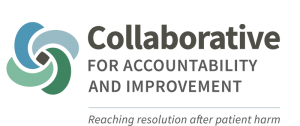Tools and Resources[ Show all or clear results ]
Journal Article
Published articles related to CRPAssociations Between Organizational Communication and Patients’ Experience of Prolonged Emotional Impact Following Medical Errors
Published articles related to CRP
Background: The emotional impact of medical errors on patients may be long-lasting. Factors associated with prolonged emotional impacts are poorly understood.
Methods: The authors conducted a subanalysis of a 2017 survey (response rate 36.8% [2,536/6,891]) of US adults to assess emotional impact of medical error. Patients reporting a medical error were included if the error occurred ≥ 1 year prior. Duration of emotional impact was categorized into no/short-term impact (impact lasting < 1 month), prolonged impact (> 1 month), and especially prolonged impact (> 1 year). Based on their reported experience with communication about the error, patients’ experience was categorized as consistent with national disclosure guidelines, contrary to guidelines, mixed, or neither. Multinomial regression was used to examine associations between patient factors, event characteristics, and organizational communication with prolonged emotional impact (> 1 month, > 1 year).
Results: Of all survey respondents, 17.8% (451/2,536) reported an error occurring ≥ 1 year prior. Of these, 51.2% (231/451) reported prolonged/especially prolonged emotional impact (30.8% prolonged, 20.4% especially prolonged). Factors associated with prolonged emotional impact included female gender (adjusted odds ratio 2.1 [95% confidence interval 1.5–2.9]); low socioeconomic status (SES; 1.7 [1.1–2.7]); physical impact (7.3 [4.3–12.3]); no organizational disclosure and no patient/family error reporting (1.5 [1.03–2.3]); communication contrary to guidelines (4.0 [2.1–7.5]); and mixed communication (2.2 [1.3–3.7]). The same factors were significantly associated with especially prolonged emotional impact (female, 1.7 [1.2–2.5]; low SES, 2.2 [1.3–3.6]; physical impact, 6.8 [3.8–12.5]; no disclosure/reporting, 1.9 [1.2–3.2]; communication contrary to guidelines, 4.6 [2.2–9.4]; mixed communication, 2.1 [1.1–3.9]).
Conclusion: Prolonged emotional impact affected more than half of Americans self-reporting a medical error. Organizational failure to communicate according to disclosure guidelines after patient-perceived errors may exacerbate harm, particularly for patients at risk of health care disparities.
Presentation/Webinar
Recorded webinars and presentationsCAI Webinar – Implementing a Clinician and Staff Peer Support Program
Recorded webinars and presentations
Jackie Ewuoso, MPH, PMP is a Senior Program Manager at the Betsy Lehman Center for Patient Safety where she manages peer support programs and other patient safety initiatives. She has several years of experience in community health addressing social determinants of health and working in chronic disease prevention. Before coming to the Betsy Lehman Center, Jackie was a public health prevention specialist at the Worcester Division of Public Health and the Central Massachusetts Public Health Alliance. In this position, she managed community health grants aimed at addressing chronic diseases by increasing access to healthy food and opportunities for physical activity. She coordinated projects and initiatives focused on policy, systems, and environmental change as a way to increase healthy eating and active living in the city of Worcester and six surrounding towns. Jackie holds a Master’s in Public Health from Boston University and a Bachelor of Arts in Psychology from the University of Ill
Linda Kenney, the Director of Peer Support Programs at the Betsy Lehman Center for Patient Safety, has had a personal experience with a near-fatal medical event many years ago. Linda identified the need for support services in cases of adverse medical events and outlined an agenda for change. For more than twenty years, she has been encouraging organizations to tackle the challenges that impair effective communication, apology, and support programs for patients, families, and clinicians following medical errors and unanticipated outcomes. Linda serves as a patient representative on numerous task forces and is on the board of the Massachusetts Coalition for the Prevention of Medical Errors.
Presentation/Webinar
Recorded webinars and presentationsCAI Webinar: CAI Webinar: Beyond Human Touch: Ethical and Practical Aspects of AI-Driven Empathy in Healthcare
Recorded webinars and presentations
Webinar Date: January 18, 2024
Presenter: Bruce Lambert, PhD, professor in the Department of Communication Studies and the Department of Medical Social Sciences at Northwestern University
Learning Objectives:
- Describe the role and capabilities of AI in empathetic interactions in healthcare: Participants will learn about the current state of AI in replicating empathetic responses, including the mechanisms through which AI mimics empathy and its effectiveness compared to human empathy.
- Weigh competing ethical implications of AI-generated empathy in healthcare: Attendees will gain insights into the ethical considerations involved in using AI for empathetic purposes in healthcare contexts, focusing on issues of transparency, authenticity, and the balance between practical benefits and ethical responsibilities.
- Critically evaluate the impact and future directions of AI in empathy: The audience will be encouraged to critically evaluate the potential impacts of AI on the future of empathetic interactions in healthcare and other professional settings, considering both the opportunities and challenges presented by AI integration.
Doctors and Litigation is a website produced by Dr. Gita Pensa, an Emergency Medicine physician at Brown was a defendant for 12 years, and regularly speaks on the topic at conferences and has a podcast “Doctors in Litigation: the ‘L’ word.”
Five doctors talk about their experiences surviving a medical malpractice lawsuit.
This article talks about strategies for combating stress and a plan for effectively dealing with the pressure of a malpractice case.
This article discusses tips that physicians can follow when they are involved in a lawsuit.
